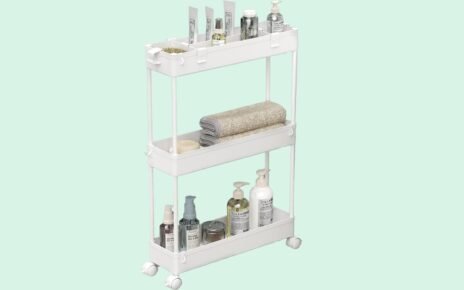:max_bytes(150000):strip_icc():format(jpeg)/summer-house-smells-GettyImages-1289045691-5fe927f015ca462a8a3a7d4b064327a7.jpg)
Summertime evokes scents of the beach, cookouts, tropical fruit, and freshly-mowed lawn. However, not every summertime whiff is pleasant—some are downright pungent. And, if you don’t stay on top of your home cleaning and maintenance, your house can end up smelling worse in the summer than in other months.
According to Natalia D’Apolito at the American Cleaning Institute, the primary reason for exacerbated odors in your home during the summer is the weather. “Even with air conditioning, there is more moisture in the air during the summer, which encourages the growth of odor-causing microorganisms,” she explains.
Her view is shared by Katie Dills, brand president of The Cleaning Authority. “Summer weather brings in warmer temperatures and humidity—which can amp up any lingering odors in the house and cause bacteria to grow at a faster rate than usual.” And when kids are home from school, and the increase of activities results in more foot traffic, she says it’s even more important to check and clean areas that are frequently used or may often be forgotten about.
Below are some of the sources for those bad smells haunting your house in the summer, and how you can eliminate—and even stay several steps ahead of—any potential odors or bacteria.
Garbage Disposal
Your garbage disposal works hard to grind veggies and food scraps, and while this makes clean-up easy, some of those smells may linger. D’Apolito recommends pouring boiling water down the drain, followed by a half cup of baking soda, then a half cup to one cup of white vinegar. “Let this mixture sit for a few minutes and then rinse with more boiling water,” she says. And for an even fresher scent, try mixing lemon juice and baking soda in a 1:1 ratio and pour it down the drain. “Let the mixture sit for up to an hour before rinsing with boiling water,” D’Apolito says.
Trash Can
While a good trash can will keep smells at bay, overtime the potpourri of food, wet paper towels, and other items can create the perfect storm of odors. D’Apolito’s advice in this scenario is to remove any trash then use soapy water and a sponge to scrub the inside and outside of the trash can, then rinse and dry the trash can afterwards. “If the smell is still lingering, wash the trash can with one cup of baking soda mixed into a gallon of water,” she says. Many bad smells are acidic in nature, and D’Apolito explains that baking soda can neutralize the acids that cause those odors.
Refrigerator
Did you know that you should be cleaning out and sanitizing your refrigerator at least once a week, according to D’Apolito? She says you should wipe up any spills as soon as they happen, then follow up with a multi-surface spray to avoid lingering odors. “Add a container of baking soda to the fridge and replace every 30 days,” she says. “The more surface area of the baking soda exposed, the better, as this will help with odor absorption.”
Microwave
For some people, the microwave is the most-used item in the kitchen—and all this use can lead to a lot of buildup of smells. “Odors from spills, popcorn, and other foods can be even more intense due to increased humidity in the air, so wipe up spills and messes as soon as they happen,” D’Apolito advises. Then, she recommends combining a lemon’s worth of lemon juice or a cup of white vinegar with a cup of water in a microwave-safe bowl, and heating the solution on high for five minutes. “Keep your microwave closed for another few minutes, then wipe the interior with a damp cloth—and this can be followed with a good clean using a multi-surface cleaner,” she shares.
Carpet/Rugs
If you, your family, and your visitors are not removing your shoes at the door, keep in mind that you’re tracking bacteria and dirt on your carpet. Many homeowners forget to remove their shoes at the door and track the bacteria and dirt across the carpet. “Not only can a buildup of grime break down your carpet fibers, but it can also harbor pollutants that may make you sick, and it can cause odors to build up,” warns Dills. She recommends vacuuming at least twice a week, along with a thorough steam cleaning every six months—or more minimally, on a yearly basis.
Couches
Whether you have kids spending more time at home due to school being out or you’re just spending extra time in the AC, you may be using your couches more often. If you lift up a couch cushion, Dills says you’ll be stunned at how many crumbs and remnants of dirt are underneath and also scattered along the exterior of the cushions.
She recommends vacuuming bi-weekly—and also rotating your cushions. “Deep cleans are only needed about once a year, but make sure you check the sofa’s cleaning code—using the tag, which is typically located under the cushion—before you get started.”
Dills explains the codes as follows:
W: This code means the upholstery should only be cleaned with a water-based cleaner. A type of sofa with this code is usually the most durable and easiest to clean.
S: This code stands for dry clean solvent only and will not react well to water. If you need to spot treat for a stain, there are dry-clean only products available, but we would recommend getting it professionally cleaned.
S/W: As you may have guessed, this code allows for the use of both water-based cleaners and dry-cleaning solvents.
Throw Pillows
Those throw pillows on your sofas and chairs that you lean back on, put your feet on, hug, and drop on the floor, need to be cared for as well. In fact, Dills says they should be thought of as an extension of your coach. “If you are going to vacuum your sofa bi-weekly, also vacuum your throw pillows, since dust and crumbs can soak into the fibers,” she says. She also notes that some pillows have removable covers, which can be tossed into the washing machine.
Curtains
Window treatments, like curtains and drapes, are easy to overlook as objects that need cleaning. “Many homeowners assume they aren’t dirty, and while we may not directly interact with them, curtains can accumulate dust and odors from around the home and need to be cleaned,” Dills explains. Some people wait until spring cleaning to tend to window treatments, but you should really clean them every season. However, Dills warns that you need to know the care instructions to determine if you can toss them in the washing machine or send them to the dry cleaners.
Pet Items
If you have pets, launder their beds and blankets on a weekly basis at a minimum. “Wash or wipe down crates regularly—being sure to rinse them completely and dry—and vacuum or dust floors at least once per week,” D’Apolito says. She recommends wiping up accidents as soon as possible, and mopping when you can see paw prints on the floor. “For pet smells on upholstered furniture, use an enzyme cleaner,” D’Apolito recommends. “For stubborn, older stains, steam clean using a handheld steamer combined with white vinegar.”
Also, D’Apolito says litter boxes should be scooped daily and the litter should be replaced monthly. “Replacing the litter is also a good time to give the litter box a deep clean: Empty it completely, then use warm water and dish soap or a mixture of baking soda and water to wipe down the inside surfaces of the box,” she advises. Rinse completely, dry, then replace with fresh litter.
Bedrooms
While you’re sleeping, your body is shedding dead skin, and you may also be sweating and releasing saliva. D’Apolito warns that common bedroom smells include body odor, and dusty or musty scents. “Wash bedding regularly, and vacuum your mattress, then follow with a fabric spray to neutralize odor,” she recommends.
Bathroom
In the bathroom, mildew and musty odors are a concern and could be caused by increased humidity levels. “When a bathroom isn’t properly ventilated, this type of growth thrives, and common areas for fungal growth include inside the shower, on walls behind towels or picture frames, or on the ceiling.” D’Apolito advises ventilating the room as much as possible. “Use an all-purpose and/or shower cleaner on the hard surfaces in the bathroom,” she says. However, if you see large amounts of mold, it’s best to bring in a professional.
She also notes that scented plug-ins can help cover smells, but warns that they’re not addressing the cause of the odor.
HVAC
During the summer, your HVAC works extra hard. And according to Brad Roberson, president of Aire Serv, a Neighborly company, it can also produce unpleasant odors if not properly serviced. However, he says that keeping it properly serviced will help it work more efficiently, and keep the home at an optimal temperature—which reduces the speed at which organic materials break down. “Homeowners should also regularly replace air filters every 30 to 90 days, depending on the needs of the homeowner,” he says, while also noting that an improperly sized HVAC system can also cause organic growth, like mold and mildew, to occur.
Other considerations
Another way to deal with odor-causing humidity levels is to use a dehumidifier. “This can be a stand-alone unit or part of the HVAC unit as a whole-home indoor air quality solution,” Roberson explains. “Dehumidifiers reduce the moisture in the air, increase the comfort level in the home, help to reduce mold growth, and increase the efficiency of the HVAC unit.” In addition, he points to indoor air quality products, like ultraviolet lamps, that can help neutralize odors in the home.
D’Apolito agrees that investing in a humidifier can help to mitigate odors. And to help with cooking odors and other types of smoke, an air purifier with activated carbon filters can help neutralize odors.




